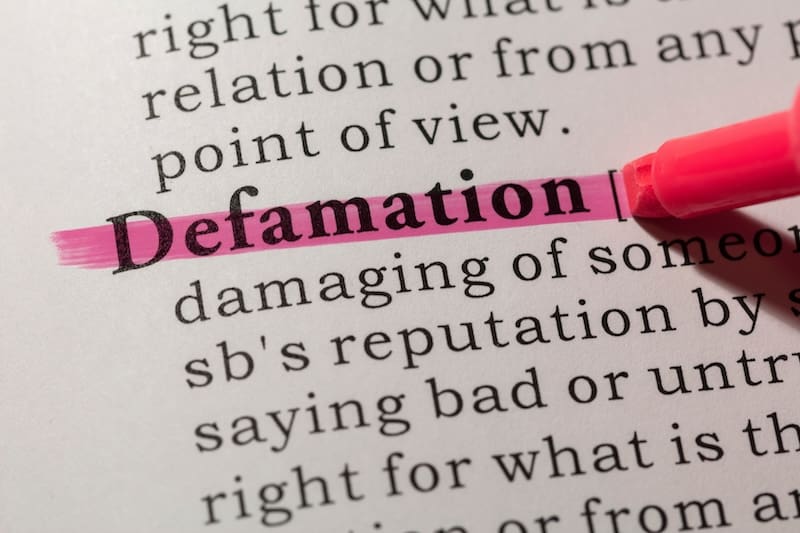An online content removal lawyer may be a valuable option when defamatory content or harmful content threatens your digital reputation.
Have you ever searched for your name on Google and been surprised — or even alarmed — at the information you find?
Has someone posted untrue information about you that’s designed to hurt your reputation?
If you’ve been the victim of slander or libel in the digital environment, this guide is for you.
In this article, we’ll explain why you might need an online content removal lawyer to help you overcome the reputation damage caused by defamatory statements and negative content published without your consent. You’ll also learn tips and strategies for protecting yourself against defamation.
If you want to speak with an internet content removal expert right away, contact us at
844-230-3803
for a free consultation.
Search Results May Put Your Digital Reputation at Risk
In the digital environment, how people perceive you on the internet is your online reputation.
Your digital footprint informs your reputation, specifically the information that people find in search results.
People use search engines like Google every day to learn about others. The quality and quantity of search results can have profound effects on how you’re perceived. Internet search results can make — or break — your digital reputation.
With a bad reputation, you run the risk of:
- Being denied a home or vehicle loan
- Never entering into a relationship with someone you met on a dating site
- Losing out on that dream job you applied for
- Not being accepted into the college or university of your choice
- Missing out on a partnership that could help your business grow
Can you afford the reputational damage caused by defamatory, false, or misleading content? If not, keep reading for all the details you’ll need to protect yourself and get content removed from social media platforms and other websites.
How Does Defamatory Content Influence Your Digital Footprint?


To understand the impact of damaging internet content on your digital reputation, consider all of the negative internet content that’s online about you or your business.
Perhaps an anonymous person posted a false statement about you on social media accounts or personal blogs. Maybe this damaging content appeared in the form of a news article or other internet news content. And with enough sharing, it can even go viral on social media platforms, blogs, etc.
If the original poster published that information with the intent of harming your reputation, that is defamation.
Before you know it, reputational damage and a negative online presence may keep you from achieving your goals.
Defining Defamation, Libel, and Slander


As a legal term, defamation is defined as “the act of communicating false statements about a person that injure the reputation of that person.”
You may have also heard the terms libel and slander when learning about defamation.
Whether online, in print, or by word of mouth, the concepts of defamation can be confusing. The terms “defamation,” “slander,” and “libel” are often used interchangeably, yet each has its own definition.
To gain a clear understanding of these terms and how they may relate to your unique situation, let’s take a deeper look at slander vs. libel.
Slander
Slander is an oral defamatory statement. That includes:
- Spreading a false statement or rumor about someone’s health status
- Making harmful oral statements about a person’s business dealings or personal activities
- Falsely accusing someone of an inappropriate or criminal act
Libel
A libelous statement is any defamatory statement in written form. This applies to a written letter, online post, printed statement, or other written content. Examples of libelous statements include:
- A Google review that falsely claims a business engaged in unsafe or scandalous behavior
- A social media post or information on other websites that starts a false rumor about someone’s physical or mental health
- A letter to the editor of a newspaper that falsely accuses someone of a crime or inappropriate behavior
In the past, courts hearing defamation lawsuits often treated the two terms differently, arguing that defamation in print was more damaging over the long term.
Today, many courts agree that the two terms have the same reputation-damaging potential.
With the considerations mentioned above in mind, have you been the victim of defamation? Have you considered a defamation lawsuit? If you have, read on for more details about what you can do to get content removed from the web.
The Communications Decency Act: Protecting Individuals from Internet Defamation


Enacted in 1996, the Communications Decency Act (CDA) was the federal government’s first attempt to regulate content on the internet, specifically content of a sexually exploitative or pornographic nature.
Since it was first enacted, the CDA has expanded in scope and is now used to protect against the publication of damaging content, including content meant to defame or harm.
The CDA has faced challenges in court repeatedly since its introduction. In 2004, the Supreme Court upheld the Act as a constitutional protection against harmful content.
What Does a Defamatory Content Removal Attorney Do?

When it comes to getting damaging content removed from the internet, there are 3 key legal strategies available. These strategies may be used by your removal attorney, a content removal service, or yourself when you’re making a removal request to the many websites hosting offending content or defamatory statements on the internet.
Let’s go over the three main legal strategies for online content removal.
DMCA Takedown Notices
Signed into U.S. law in 1998, the Digital Millennium Copyright Act (DMCA) strengthens copyright laws on the internet. Specifically, it criminalizes the production and sharing of products, services, and technologies designed to circumvent copyright infringement protections, such as Digital Rights Management (DRM).
You or your attorney can submit takedown requests or file a cease and desist letter related to content on the internet that violates your rights under the Act. This includes infringing content like revenge porn and unwanted content created purposely to damage your reputation.
Terms of Service Violations
Similar to a DMCA takedown notice, you or your attorney can claim that damaging internet content violates the hosting websites’ terms of service (ToS). The key here is that many websites are hosted by Internet Service Providers (ISPs). These ISPs often have strict terms of service related to posting or distributing harmful, defamatory, or false content.
If you’ve had your records expunged or your criminal charges have been dropped, yet your false or misleading content is still online, a Terms of Service takedown demand letter stating your interest in removal can be a great option. These demand letters are typically sent from your legal team by registered mail.
Court Expungements
Expungement, also known as expunction, is the court-ordered process whereby a person’s arrest report, criminal records, or mugshot images are removed from public records. In essence, an expungement is a form of setting aside a criminal conviction.
In many cases, material relating to an old arrest creates damaging internet content. If the records have been sealed or the charges were dropped, websites hosting a defamatory statement based on your criminal records may be liable under federal law.
Your or your criminal defense attorney can apply to have records expunged or your case sealed to remove defamatory search results. Typically, this request is made via court orders to the Clerk of Courts.
Once your request for expungement has been granted, your negative information can be removed pursuant to the order from public records databases. From there, websites and social media platforms must also remove negative internet content or face civil penalties or other legal ramifications.
Tips for Protecting Yourself Against Defamatory Content


Content removal services used by reputation management firms can vary in price, complexity, and time. These proven strategies help restore reputations damaged by defamatory or infringing content on the web.
Even without a reputation management company’s help, there are a range of solutions you can try on your own or with the help of an attorney.
Delete Your Social Media Accounts
One of the fastest ways to remove content from the internet is to take control of your profiles on social media platforms. If you’re no longer on Facebook or Twitter, people can’t tag you or post negative content designed to harm you.
Removing content from social media is as simple as closing your account. Each platform has its own method for doing so. Visit your profile settings for more details.
Request Internet Content Removal from Websites
Your first strategy when it comes to removing content from the web is to reach out to webmasters. This is also the most cost-effective option.
A well-written letter can make all the difference when it comes to convincing someone to voluntarily remove negative material from their website. When you send takedown requests, state your case clearly. For example, explain that your private information is available without your consent and it’s putting you at risk.
To find out who owns the website hosting the content, you can use the ICANN registration data lookup tool. This way, you can quickly direct a removal request to the right people.
Be advised that asking a webmaster to remove content may not always work. In fact, without a court order, many webmasters are reluctant to remove offending materials. They argue that this act would infringe on free speech. In this case, a cease and desist letter drafted by an attorney may be useful.
Opt-Out of Data Broker and People Search Sites
You can prevent data brokers from sharing your records once and for all by completing an opt-out request. Most sites have some form of opt-out process. Follow the directions on each website until your records are no longer visible in searches.
Generally speaking, it may take several days or weeks for information to be removed from websites after an opt-out request is made. Many websites update their records on a schedule. After some time, your information will no longer be in Google’s search results.
Request De-indexing from Google and Other Search Engines
Certain types of infringing content or defamatory statements may continue to damage your reputation unless you get them removed. One possible solution is known as de-indexing. This is done by filing a request with search engines like Google or Bing.
If your written takedown requests to webmasters didn’t work in getting content taken down, you may contact Google directly and ask for de-indexing. Simply put, this is when Google removes a URL pointing to a specific piece of content, like a statement that hurts your reputation or is untrue.
Content Suppression to Influence Search Results
If content can’t be removed for whatever reason, a suitable alternative is known as content suppression.
This strategy uses good content published on the web to push down negative content in searches. With enough fresh material, including positive news articles, blog posts, and social media interactions, false or misleading information will be pushed off the first page of results, effectively hiding it from the majority of search users.
You can publish fresh content on your own website or ask industry peers and others to host the content for you. With good communication and a bit of creativity, suppression works when other options don’t produce the results you desire.
Legal Remedies With the Help of a Lawyer
An online content removal lawyer or law firm specializing in internet content removal may be a valid option if your other attempts to remove content have not been successful.
Attorneys specializing in content removal services know how to make a removal request that meets recordkeeping requirements under the Digital Millennium Copyright Act and similar internet protection laws. Another benefit of hiring a legal professional is that they have a deep familiarity with defamation laws, including Florida law and the laws in other states.
They may also be aware of any new law that references content removal websites and their legal obligations when presented with a removal request. Many of the attorneys working in the internet content removal field were in criminal defense and have a keen understanding of how damaging online defamation can be to one’s personal or professional life.
Obviously, an online content removal lawyer or internet defamation lawyer is not your only option for removing content. However, as a solution when all others fail, your removal attorney can help you overcome any challenges you may face as you work to restore your internet reputation from damaging search results.
Contact OnlineReputation Today


OnlineReputation is a leader in information resources for the online reputation management industry. Our guides provide the details you need to make informed decisions about choosing the right services for your reputational needs, including internet content removal services.
Wiping defamatory content or damaging content from the internet can be a complex and frustrating process. Our guides to content removal and internet defamation make it easy to understand your options, empowering you to make smart decisions.
To learn more about negative content removal options, contact our office today at
844-230-3803
for a free consultation.















